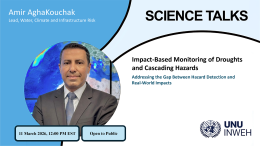The overall objective is to consolidate and accelerate the Network of Centers of Excellence (NoE) in support of Disaster Risk Reduction, Early Warning and Anticipatory Action (AA) in Africa and to support the coordinated use of AA throughout Africa to reduce disaster risk effectively and equitably.
The project is implemented through
- Enhancement of science-based, user-driven, and action-oriented risk information;
- Capacity development and collaborative, shadowing/on-the-job learning, including in-country assessment workshops to evaluate risk capacity gaps in the identified priority countries;
- Contributions to the governance and sustainability of the NoE;
- Project management, coordination, and dissemination.
The project seeks to extend the consolidation and acceleration of the NoE-II in order to facilitate the cooperation between national stakeholders, academia, and implementing institutions across Africa to provide technical-scientific knowledge and capacity development to adequately inform anticipatory action design, decision making processes and mainstreaming of ex-ante climate risk management approaches in policy development. In doing so, the project will empower state- and non-state actors to take adequate anticipatory precautions, including improved interfaces with emergency response and post-disaster relief operations, to ultimately strengthen the resilience of vulnerable communities. Key actors in achieving this objective include national, sub-national, and local disaster management agencies, hydrometeorological agencies, sector specific agencies (agriculture, water, health), humanitarian actors, research institutions and NGOs (national and local) among others.
- Project Manager
- Dr. Joerg Szarzynski
- Team Members
- Kim Pham




